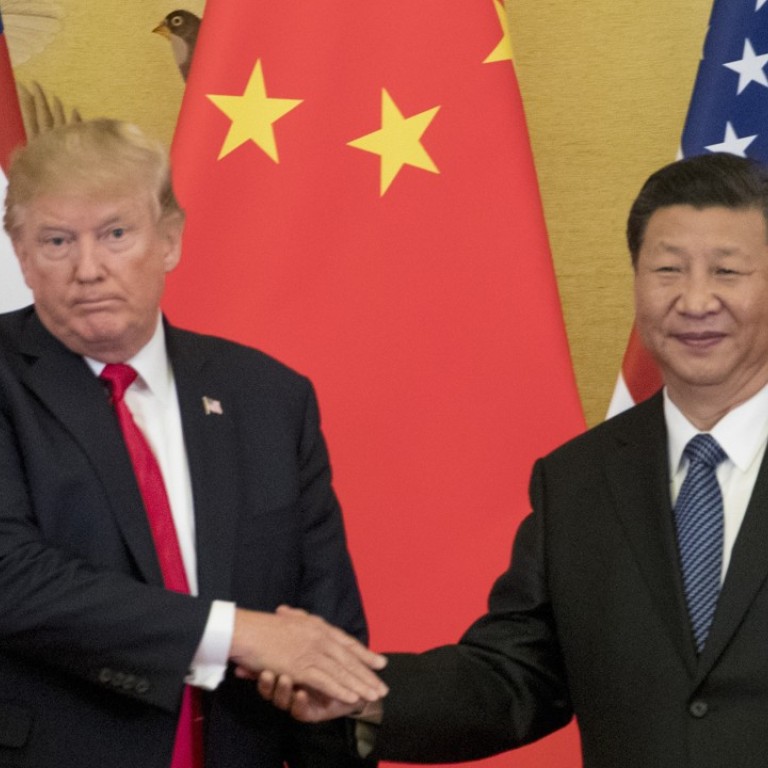
China’s ‘truce deal’ includes offer to buy more US natural gas, improve IPR protection, source says
- Beijing also reaffirms pledge to provide easier access to its markets for US firms, foreign relations expert from government think tank says
- But analysts remain uncertain on how close nations are to finding a resolution on their many issues
China has offered to buy more natural gas from the US and improve protection for intellectual property rights in a bid to reach a trade war truce ahead of the planned meeting of Presidents Xi Jinping and Donald Trump this month, a Chinese source said.
“China has a high demand for natural gas and buying it from the US would not affect its purchases from Russia,” the foreign relations expert from a government think tank said on condition of anonymity.
The offer of better intellectual property protection and greater market access for US firms was also on the table, he said. China also offers to buy more US agricultural products.
Xi and Trump are set to meet in Buenos Aires at the end of the month on the sidelines of the G20 summit.
US-China trade war: worst yet to come for Chinese economy, say analysts
On Friday, the US president said China was ready to make a deal to defuse trade tensions and that he had received a proposal from Beijing.
“China wants to make a deal,” he told reporters. “They sent a list of things that they are willing to do.”
“I think a deal will be made and we will find out very soon,” he said.
While the list of 142 items included “a lot of the things we asked for”, it was not complete, he said.
“Some things were left off. We will probably get them, too.”
Trump said he had not accepted the offer, but was optimistic about reaching a “reciprocal” agreement on trade.
China’s US$3 trillion dollar debt ‘could trigger a financial crisis’
While his remarks raised hopes of a deal – and caused a spike in the Dow Jones Industrial Average – CNBC later quoted the White House as saying there was as yet no sign of a deal and that Trump was simply being optimistic.
Since July, Washington has imposed tariffs on US$250 billion worth of Chinese imports, while Beijing has slapped similar duties on US$110 billion worth of goods it imports from the US. In September, Trump threatened to extend the tariffs to the US$267 billion of Chinese imports currently not subject to the duties.
The foreign relations expert said the telephone call between Xi and Trump earlier this month had created some momentum, while three others sources told the South China Morning Post this week that Chinese Vice-Premier Liu He was set to travel to the US ahead of the presidents’ meeting.
While China may be hoping a projected slowdown in economic growth in the US next year and the conclusion of the midterm elections will provide incentives for Washington accepting its offer, analysts remain pessimistic about the chances of a breakthrough.
China’s top trade negotiator aims to kick start new round of talks
Chen Wenling, chief economist at China Centre for International Economic Exchanges, a think tank in Beijing, said it was unlikely that the fundamental issues between China and US would be resolved in a short space of time, but holding talks would go some way to relieving the tensions.
“As for the 142 demands from the US, some can be resolved by accelerating reforms in China, some can be resolved through talks between China and the US, but some have touched China’s line and are not negotiable,” she said.
“The summit between the two leaders is key, as it will set the tone of bilateral relations.”
One of the sticking points in the negotiations between Washington and Beijing has been the role of China’s state enterprises, which according to the US create an uneven playing field because of the massive funding they receive from the government.
US-China trade war: more tariffs will hurt both countries, WTO official says
“It is quite difficult,” a former Chinese trade official said on Saturday. “If strong measures are taken, the outside world will think China has backed down, but if they are not, they [the US] will think you are not sincere.”
The official, who asked not to be named, said the two sides might take firm steps to end the trade war only when they feel its full effect, which might still be a year away.
“The impact of the tariffs and China’s retaliatory measures haven’t been fully felt yet,” he said. “It might be in a year’s time when the damage gets too much that the two sides change their stance.”
The foreign relations expert said Beijing’s latest offer to open up its markets was much the same as the pledge made by Xi at the Boao Forum in April, when he said China would “significantly broaden” market access, ease restrictions on foreign firms, lower import tariffs, and create a more attractive investment environment.
Xi said also that China would reform its motor industry to allow foreign carmakers to operate wholly owned factories in the country. Tesla later announced a deal to build such a plant in Shanghai.
China says strong US economy shores up its exporters
William Zarit, chairman of the American Chamber of Commerce in China, said on Saturday that Beijing and Washington still had a long way to go to settle their differences.
“Reform in the West means to privatise, to become more competitive based on the market rules,” he said.
“In China over the past five or six years, the reform was to strengthen SOEs, and that is why there is a divergence. China remains one of the least open economies among major trading countries. There is a long way to go.”
Zarit said also that members of the American chamber were finding the US tariffs more damaging to their businesses than China’s tariffs.


